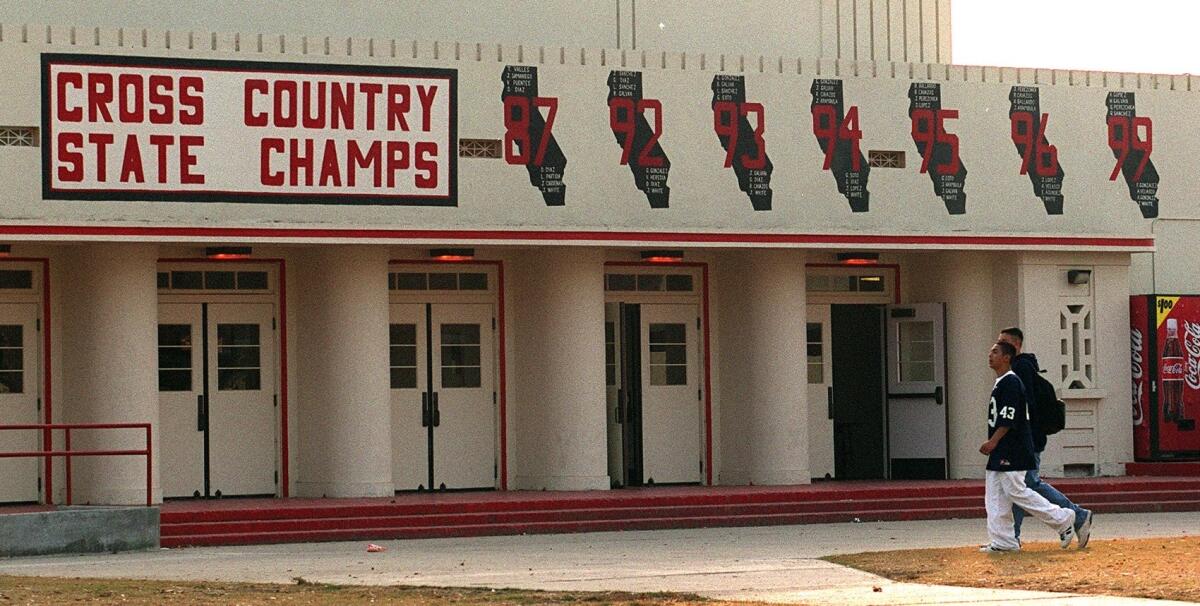McFarland cross-country team wins its 7th California title

Winter comes to this beleaguered farm town the same way every year: The last vineyard is picked and the jobless rate soars to 30%, rain falls, fog descends and the boys from McFarland High -- running for a town’s pride -- try to bring home another state championship.
This winter, the cross-country team, drawn from farmworker families in the tiny Kern County community, won its seventh state title in 13 years of competition -- more championships than any other high school in any sport in California.
Their remarkable season, which began with team members picking grapes and peaches alongside their parents in the grueling summer sun, will end Friday in the state Capitol. Arriving in two vans, the boys and their legendary coach, Jim White, will be toasted by Gov. Gray Davis and the state Assembly for their accomplishments.
Assemblyman Dean Florez (D-Shafter), who is sponsoring the trip and a special resolution commending the team, said their journey is extraordinary not only for athletic achievement but also for what they had to overcome to even be in the race.
“What the McFarland runners have accomplished is incredible, and their success and work ethic stand as a lesson for young people all over California, especially Latino youth,” said Florez, who grew up a few miles down the road from McFarland, a high school sports star who went on to Harvard University’s Business School.
“You would think everything is against these kids. McFarland has one of the highest unemployment rates in the state. It’s a place of deep poverty. And still, through hard work and determination and the idea that no one can stop you except yourself, they’ve overcome. It’s a story of great runners but it’s also the story of California’s farmworkers, the people who put the food on your table every day.”
The Mexican migrant families who have put down roots here often must rely on the wages of their children, farmworkers as young as 8, to scratch out a living. For team members, it has meant toiling during the summer in the vineyards and fruit orchards of the San Joaquin Valley. At the finish of each day, the families from rural Mexico hand over their fleet-footed sons to Coach White, a.k.a. Blanco, and they watch as he leads the boys back through the fields, running miles and miles in clouds of dust, to championships, and other miracles too.
The cross-country program has been a path out of poverty for dozens of farmworker children who have gone on to college and now work as teachers and journalists and prison guards. They not only return to attend the meets held from September through November, but also help mentor and train with the boys, running through the same fields that once brought them to their knees. Behind them on his bicycle, pedaling madly to keep up, is their coach and second father figure.
“Our goal every year is to win the state,” said the 56-year-old White, a quiet man who looks like a cross between actors Clint Walker and Clint Eastwood in their younger days. “We came in fourth in ’97 and fifth in ‘98, and this year we worked a little harder and made it happen. Our slogan this year was ‘Depende de Nosotros,’ ‘It depends upon us.’ ”
After years of turmoil in town growing out of a mysterious cancer cluster involving nearly two dozen children, eight of whom died in the 1980s and early 1990s, the boys and their string of championships are seen as a kind of redemption. Seven huge silhouettes of the state of California -- with the names of each team member -- have been painted on the gymnasium wall.
“You see towns get behind football and basketball. Well, those are easy,” said City Manager Gary Johnson. “Here it’s cross-country. A lot of it has to do with the attitude of Coach White and the boys. Every day, they’re running through these fields. It’s the same with this town. Through perseverance and pulling ourselves up by the bootstrap, we’re turning a corner.”
Johnson said the unemployment rate has dipped below 30% for the first time in several years, and new houses continue to rise at the edge of town. For the first time in years, McFarland has a bank. The population, minus the inmates at the local private prison, has edged past 8,000. Gone are the Dust Bowl refugees who built Main Street and the Pentecostal churches under mulberry trees. More than 95% of the residents come from Mexico, most of them from the village of Huanusco in the state of Zacatecas.
Inside the tiny chambers of the City Council, Johnson points with pride to a huge wood-and-cardboard model of the town that lays out a grand vision of the future: a mall, hotel, fun park and amphitheater, with a Mexican-style center plaza.
“This town has dreams and sometimes they’re bigger than what we can achieve,” he said. “One thing for sure -- we’re working on putting up a big sign on the bridge overlooking California 99: ‘McFarland -- Home of the Seven-Time State Champs in Cross-Country.”’
More to Read
Start your day right
Sign up for Essential California for news, features and recommendations from the L.A. Times and beyond in your inbox six days a week.
You may occasionally receive promotional content from the Los Angeles Times.





